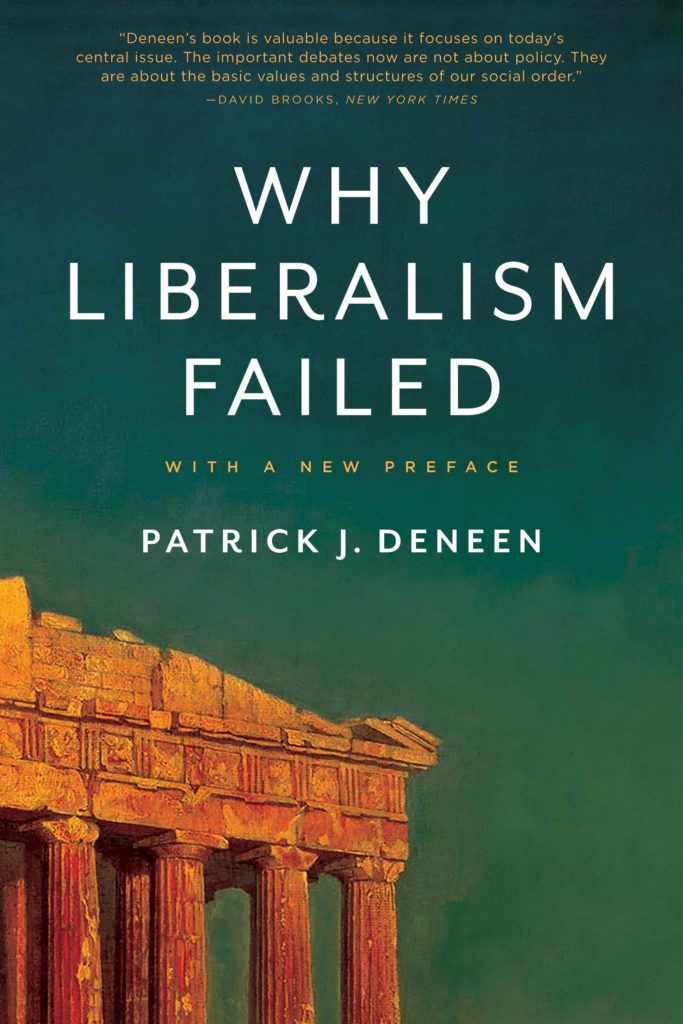Much ink has been spilled since 2016 on the subject of liberalism’s demise, but nothing I have yet read surpasses Patrick Deneen’s Why Liberalism Failed (2018) in insightfulness or force of argument. In measured language, and with requisite restraint, Deneen quietly picks apart the contradictions and false assumptions of the liberal project, demonstrating how these failings have led us to the present moment of near-universal pessimism, when both Left and Right, in North America and Europe, are being pulled further apart by nakedly revolutionary populist insurgencies. Deneen distinguishes himself from these competing political forces by recognizing that the post-WWII liberal order offered massive upsides: “No other political philosophy had proven in practice that it could fuel prosperity, provide relative political stability, and foster individual liberty with such regularity and predictability.” Deneen is not dancing on liberalism’s grave, nor is he naively optimistic that whatever political system replaces liberalism will improve upon its shortcomings. Rather, he is concerned with pointing out, to the very people most likely to have benefited from the liberal world order, why it is that citizens across the Western world are increasingly in revolt against it.
His first line of argument is, to my mind, the strongest: that liberalism is itself unsustainable, for it fatally weakens the very social bonds that made democracy and cooperative government possible. The “anthropological assumption,” as Deneen terms it, at the heart of liberalism is that the autonomous individual, liberated from legal and social constraints, is best positioned to make judgments about how to live his or her own life. In practice, however, that meant a relentless erosion of the social fabric and a weakening of familial bonds that has brought a crushing sense of isolation and vulnerability rather than an empowered freedom. To cast your eyes at the dire state of marriage in the Western world, or the growing infertility of its women, is to witness a barren social landscape, rich in material goods but poor in spirit, unable to regenerate the cohesive, trusting communities which gave birth to liberalism itself. Absent a concrete vision of the good, once provided to us by the very religions we have cast aside in the name of liberty, we flounder in the sea of selfhood, unable to master our basest desires or orient ourselves in any direction beyond pleasure.
In this world, gratitude to the past and obligations to the future are replaced by a nearly universal pursuit of immediate gratification; culture, rather than imparting the wisdom and experience of the past so as to cultivate virtues of self-restraint and civility, becomes synonymous with hedonic titillation, visceral crudeness, and distraction, all oriented toward promoting consumption, appetite, and detachment. As a result, superficially self-maximizing, socially destructive behaviors begin to dominate society.
Ours is an eternal present, shorn of any positive vision of the past and oblivious to a future beyond our own lifespans. The sum total of human development – in philosophy, literature, music, economics and government – can boast only of a self-centred, petty and puerile product, the modern man or woman, fundamentally a consumer rather than a producer, equal parts ignorant and self-assured.
Liberalism, Deneen charges, played a pivotal role in the creation of this self-centred human being because it was liberalism that bulldozed the unique cultures of the various cities and countries of its empire, replacing them with a homogenized “anticulture.”
Anticulture is the consequence of a regime of standardizing law replacing widely observed informal norms that come to be discarded as forms of oppression; and it is the simultaneous consequence of a universal and homogenous market, resulting in a monoculture that, like its agricultural analogue, colonizes and destroys actual cultures rooted in experience, history, and place.
For one example of this anticulture, you need only note the vogue for glass-and-steel architecture all across the Western world, where new and massive buildings erected as monuments to the liberal world order champion a sterile aesthetic hostile to the local architectural traditions. As I write this, three large condominium towers are in construction in my local neighborhood, resembling space ships not only in their futuristic construction but in the feeling they impose on onlookers of having been dropped from the sky rather than built from the native soil. The legal system of “human rights” exported by liberalism resembles these towers in its arrogance and contempt for the particularities of local customs, long sanctioned by adherence and adaptation to the particularities of place and circumstance.
But the final and most fatal of liberalism’s failings is its utter inability “to foster self-governance,” which is an indictment as old as liberalism itself. Yes, by all means, free the human being, maximize his or her liberty, but for what end, to what purpose? Absent that higher purpose, which liberalism delights in withholding, you present a terrifying possibility: the unleashing of the appetitive individual, the consumer par excellence, the man whose desires dictate his direction. Such a person is hedonistic, underdeveloped, immature, and easily controlled – all qualities better suited to slaves than free citizens of democratic countries. And, as Deneen so perceptively notes, every forfeit of individual responsibility is met in turn by an expansion of government.
